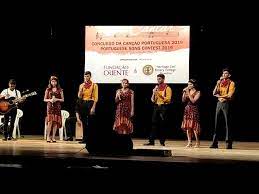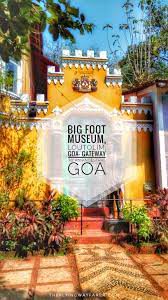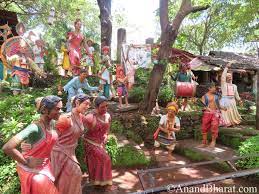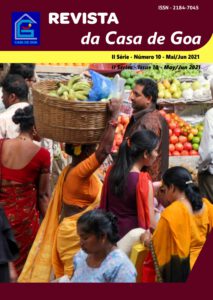Goa has a ‘very powerful, deep and loving connect’ with its Portuguese past, says Portuguese language teacher Maureen Álvares, in a chat with Óscar de Noronha, on the monthly chat show Renascença Goa.
Use the following link to listen to the original chat in Portuguese on the YouTube channel of Renascença Goa: https://www.youtube.com/watch?v=BRuax1W6O8w
ON: What attracts your students to the Portuguese language?
MA: In fact, when at the very beginning they opt for the Portuguese language, that is, in class VIII, I feel that they do so thinking that it is easier than French or Konkani. Well, initially I used to feel amused to hear these responses: ‘Oh, my grandparents used to speak; I adored listening to that.’ Or, ‘Aunts and uncles that I have in Portugal speak Portuguese. I would like to learn a bit more to be able to communicate better with them.’ This is another way in which students are attracted to opt for this language; and, well, with pride, I can say that Portuguese is a language that presents a stage wider than that of any other language. I do not know if Hindi, Konkani or French have the same variety of programmes, like ‘Vem Cantar’, one of the main ones; Noite de Fado, or the “Skits” that the teachers used to put up; and now many colleges do. St. Xavier’s has done it for some years now and we at Loyola’s have begun and it is now the fourth year in succession that we are going to present this programme.
ON: You mean the “Lusophone Festival of Art and Culture”, don’t you?
M: Yes!
ON: Makes sense… Goa has always been Portuguese-speaking. It really makes sense that they should choose Portuguese, rather than French… How many students do you have each year?
MA: Well, when I began teaching at Loyola, there were 7 students and luckily, the following year the number increased to 18; and we’ve even had 63 students in a division. Now we have a more ‘reasonable’ number. We have 38 students in class VIII. It is only that in class X this year we have 58 students that are appearing for the state board exams, SSC.

ON: What activities do you have as a part of the curriculum?
MA: Well, we do not have a lot of time for a lot of things, but we have a hall with a stage and the students of class IX put up small plays, a restaurant scene, for instance. And they do it with a lot of enthusiasm: acting as a waiter with a tray, the food, the drinks… It is interesting. And it is in this way that they sense a common factor in languages.
Something very interesting happened when one of my students was answering his exam. I was explaining that Salcete taluka’s spoken Konkani had incorporated many Portuguese words. And when the student could not remember the Portuguese word for spectacles, I said they should close their eyes, think, take a small break…. He immediately remembered the word óculos, and used it!
ON: Do you think that the Portuguese music competitions have also contributed a lot in this regard?
MA: Yes, they have! When I take groups to participate (always more than 2-3 groups) in competitions like ‘Vem Cantar’, for example, it is truly a lot of work. That’s because with so many places where I teach, that is, not only at Loyola’s, but also at Rosary’s, and I also travel to the higher secondary of St. Andrew’s, Vasco da Gama, I do feel tired… perhaps it is the age, I do not know.
ON: Well, that’s a missionary spirit!
MA: Yes!
ON: But the competitions have helped. For example, ‘Vem Cantar’ started more than 14 years ago, I think…
MA: That’s right.
ON: And there are participants who do not know Portuguese…
MA: Yes! As part of a group from Loyola’s, which won the first place, there were only 2 students of Portuguese. Most were students of French.

ON: Therefore, it would perhaps be fair to say that it is easier to learn the language through music, wouldn’t it?
MA: It is true, it makes sense. But in a school like Loyola, it is a bit difficult. Imagine, if we were to listen to music, the entire school would stop. Therefore, listening to music during class is not possible.
ON: But the students can do this privately…
MA: They can and should.
ON: Today we have the internet which helps by giving access to all kinds of music from any part of the world. And thus it is easier. And you, Maureen, always take good groups to contests, competitions, or wherever you go…
MA: This is because the students show interest. Frankly, they are the ones who accept the opportunity, accept the effort, and in this effort I get help from my children: my son and daughter train the students to sing. My daughter, in the area of drama, too, and the students and their parents put in efforts, come over to my home, practice… and this happens almost every evening. There are days when we are working till almost 10 at night. I could not have had better help than from the parents of those students….
O: So it is not only your individual or personal effort! It is clearly a collective effort, a family effort… The family is always helping you…
MA: Oh, you mean my family! Yes!
ON: As regards conversation… how does it go? Do you feel that by the time the students reach class XII, they are in a position to hold a conversation in Portuguese?
MA: No! And that’s simply because they are part of a larger group. And when the group is, for instance, on the playground, they either speak English or Konkani. So to attempt conversational skills among them is fine, but most have friends who have opted for French or Konkani.
I’ve also been fortunate to have a South Indian student who spoke Malayalam. When he came to Goa, he had started speaking in Konkani. He won a prize for Konkani in class V. Just imagine, at 10 years of age, he could speak English, Malayalam, Konkani, Hindi which is mandatory; and in class 8 was already learning Portuguese. So I would love to know what student, in Portugal, or France, or any other place in the world, is able to speak five languages fluently at 10 years or even at 12 or 13 years of age! Not possible.
We are a multi-lingual society. It does not enable develop conversational skills.
ON: Yes, in a polyglot society they often use words from several other languages. There are many influences…
MA: But it is like in any other language, like English or Konkani. Now in the group that is going to class IX, we have Muslim and Hindu students. And how does one enable these students to listen to the language? RTP! If not on television, there are RTP programmes on YouTube as well. They can hear the language there too.
But what helped me a lot – and I say this very often, when have teachers’ meetings – is that for students to be able to better connect with the language, they should listen to the Eucharistic service. My suggestion has borne fruit, for it is not the Catholics alone who follow their little missals in English while they listened to a Mass being held in Portuguese…. I found it interesting that the Hindus and the Muslims used to follow the Eucharistic service with greater interest than the Catholics who found it tiresome to attended Mass at church in the morning and later do this exercise at home.
ON: Unfortunately, there are no Portuguese-language newspapers here… but what about your annual school magazine: does it have a Portuguese section?
MA: Students of class X, particularly those of Portuguese, always produce articles like ‘My last year in school’, ‘Goodbye, Loyola!’, etc. – always farewells or memories. But over the years we’ve received good articles…
ON: That’s good… And before we wind up… We’ve spoken about your students, and now, on a personal note, how did you decide to be a teacher of Portuguese?
MA: Well, I never wanted to be a teacher nor did I think I would ever be one. It probably never made sense when I began, because there was a need for a teacher who could teach both French and Portuguese. When a teacher of Portuguese and who also taught French was going on leave, my sister-in-law, who knew the Principal of Loyola’s very well, asked me if I would want to teach. I said I wouldn’t mind….
ON: Congratulations! … And how do you divide your time?
MA: Well, it is difficult but when people do like what they do they do not feel that they are limiting their time to one thing or another. Well, cooking is something I don’t like to do…
ON: What! Not even Portuguese cuisine?!
MA: Neither. But I love to eat. That’s easy, because I have a fantastic family, husband and children who help a lot and are not difficult to please. So it works out.

ON: And how about your Museum? You are vital to its working!
MA: The Big Foot, right? Now it is my daughter who does most of the work, but earlier, when we had just begun, I helped my husband. Of course, the material was always in English.
ON: Do you get a lot of Portuguese tourists?
MA: More of Brazilians. We have a huge family in Portugal, so there are always family recommendations and visitors to Goa always drop by.
ON: Did you ever think of translating the name “Big Foot”?
MA: ‘Pé Grande’? No! Frankly the name ‘Big Foot’ was decided upon by the locals, but its real name is “Ancestral Goa”.
ON: ‘Pé Grande’ or, I would say, ‘Pé Gigante’…
MA: ‘Pé Gigante’, yes, it is! Also, at Big Foot we have made a great effort to present to the public what we are: Goans, and proud of being so, because we have had this very powerful, deep and loving connect with our past, when we had the Portuguese here for so many years.
Something interesting happened way back in 2006 when we visited Europe for the first time. We were visiting Aveiro where we went to this pastry shop called “O Peixinho Pequenino”. They wanted my husband and me to try out Ovos Moles. While he was packaging the desserts, he said, “Where are you from?” and my cousins answered, “They are our cousins from India. From Goa. And he said, something very curious and beautiful, “With the Goans we have a connect that comes from the womb of our mothers.”

ON: Very beautiful. And may this connect continue to flourish and enrich us.
MA: Both sides.
ON: Right! That’s all for today, Maureen! Your students are always welcome to our studio for more programmes.
MA: Thank you!
ON: Meanwhile, instead of wishing you ‘good luck’, let me say: May your students make giant strides…
MA: Thank you!
Translated from the Portuguese by Maureen Álvares
First published in Revista da Casa de Goa, Série II, N.º 10, Março-Abril 2021

Tive muito prazer ver este programa da Renascença. A entrevista com a Sra. Profa. Maureen Álvares foi informativa; fiquei agradavelmente surpreendido com o efectivo dos jovens que se matriculam para o estudo do Português. A proverbial cereja sobre o bolo foi saber que a Profa. Álvares é da minha aldeia, Loutulim. Parabéns Óscar por mais uma magnífica edição da Renascença
Obrigado, António! Um abraço.
Mais uma entrevista muito esclarecedora sobre o interesse pelo Português entre estudantes goeses.
Parabéns à professora que sabe bem como estimular os alunos, que, hoje em dia, têm muitas possibilidades através da Internet, como se afirma.
Agradeço ao autor, claro!
Obrigado pela leitura, Dra. Maria Ivette Colaço!
Embora atrasado, deixo aqui o meu comentário: uma bela entrevista!
Parabéns ao entrevistador e à entrevistada, que são figuras relevantes da elite cultural goesa e que saúdo com amizade.
Obrigado, Sr. Comandante!
Paulo Gomes speaks to Savio de Noronha as ‘Vem Cantar’ completes 25 years on the cultural map of Goa
https://youtu.be/l13UJhfXvbg
https://youtu.be/v1OemQoIW_Y